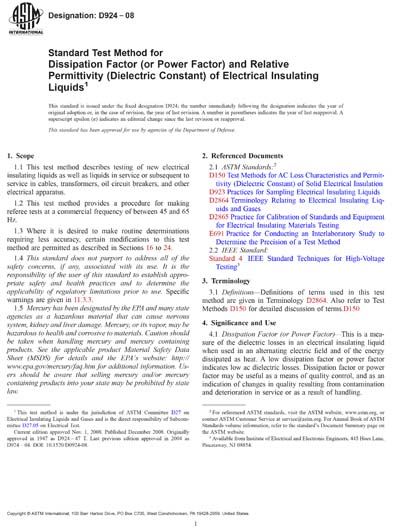Historical
ASTM D924-08
Standard Test Method for Dissipation Factor (or Power Factor) and Relative Permittivity (Dielectric Constant) of Electrical Insulating Liquids
1.1 This test method describes testing of new electrical insulating liquids as well as liquids in service or subsequent to service in cables, transformers, oil circuit breakers, and other electrical apparatus.
1.2 This test method provides a procedure for making referee tests at a commercial frequency of between 45 and 65 Hz.
1.3 Where it is desired to make routine determinations requiring less accuracy, certain modifications to this test method are permitted as described in Sections 16 to 24.
1.4 This standard does not purport to address all of the safety concerns, if any, associated with its use. It is the responsibility of the user of this standard to establish appropriate safety and health practices and to determine the applicability of regulatory limitations prior to use. Specific warnings are given in 11.3.3.
1.5 Mercury has been designated by the EPA and many state agencies as a hazardous material that can cause nervous system, kidney and liver damage. Mercury, or its vapor, may be hazardous to health and corrosive to materials. Caution should be taken when handling mercury and mercury containing products. See the applicable product Material Safety Data Sheet (MSDS) for details and the EPA's website: http://www.epa.gov/mercury/faq.htm for additional information. Users should be aware that selling mercury and/or mercury containing products into your state may be prohibited by state law.
ASTM International [astm]

